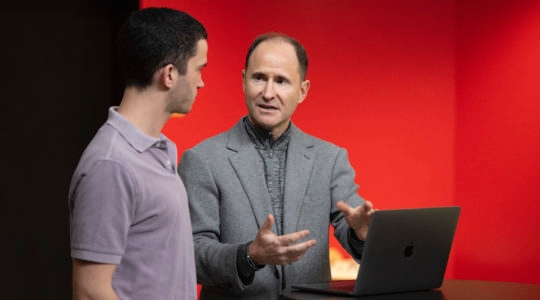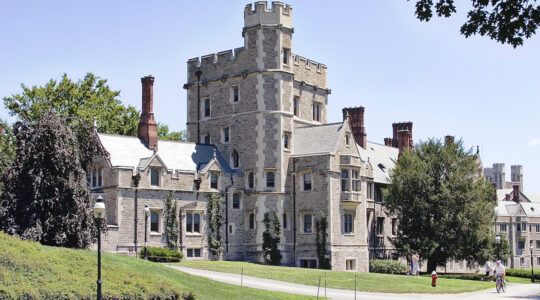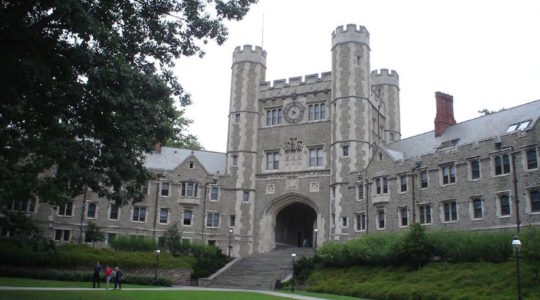DETROIT (JTA) — The Jews of Detroit, which hosted this week’s Democratic presidential debates, are proud of their role in the recovery of their city. Scott Kaufman, CEO of the Jewish federation here, described efforts spearheaded by the philanthropy to encourage younger Jews to move back into the city, and the relatively youthful congregants at the Downtown Synagogue.
Jewish leaders are especially proud of the role played by Daniel Gilbert, the local boy who founded Quicken Loans and who has led the revitalization of the city center. I can’t tell you how often I heard that I and other debate-goers would not have been able to safely stroll to the Fox Theatre a decade ago, and that much of this was thanks to Gilbert.
But Jews being Jews, this wasn’t a unanimous opinion. Rabbi Alana Alpert, who leads Detroit Jews for Justice, provided a counterpoint: Gilbert was “not elected to make decisions,” and some of the development has pushed people out.
That disagreement is an echo of wider tensions in the Jewish community here and elsewhere, between a largely liberal but moderate mainstream and vocal progressives. These and other tensions were on display this week in Detroit, where I attended the debates. Over two nights, the 20 Democratic contenders showed a willingness to tear down the moderate frontrunner, former Vice President Joe Biden, and uncertainty about how best to achieve the ultimate goal of unseating Donald Trump.
The rhetorical bloodletting at the Fox Theatre, and the looming battle ahead of November 2020, is deeply unsettling this community of over 70,000 Jews.
Hy Safran and David Kurzmann of the local Jewish federation set up for me a roundtable with a diverse array of major donors, lay and professional leaders, and folks who have been deeply involved in the community. It was a true gathering of Michiganders: The exchange I witnessed was tough, loving and candid, delivered in broad Midwestern cadences. (The round table took place in Jewish federation offices in suburban Bloomfield Hills, but everyone spoke in a personal capacity and not on behalf of any group.)
The picture emerged of a community stuck between a rock and a hard place, grappling with a president that most Jewish voters revile for his apparent biases and a Democratic Party that appears increasingly driven by its Israel-critical left wing. Locally, a large Muslim-American community’s sympathies often extend to Israel’s regional rivals and enemies.
Only one of the 14 participants, a pro-Israel lay leader, would not be identified, but I was permitted to quote that person on background, who like the others spoke in a personal capacity.
I spoke to other folks around the city as well, and in and around the spin room. Here are some takeaways.
Rep. Rashida Tlaib must go
At the Jewish federation round table, there was a consensus: The Palestinian-American freshman in the 13th District has got to go.
“We in this community will go against Rashida Tlaib,” said Lisa Lis, a philanthropist who is also a contributor to Democratic candidates, and who otherwise during the roundtable was vocal in her criticism of President Donald Trump.
There were nods around the table. I was told that there had already been outreach to Brenda Jones, the Detroit City Council president whom Tlaib defeated in last year’s primary, and who is considering another run. I was also told that pro-Israel folks were already socking away money to target Tlaib.
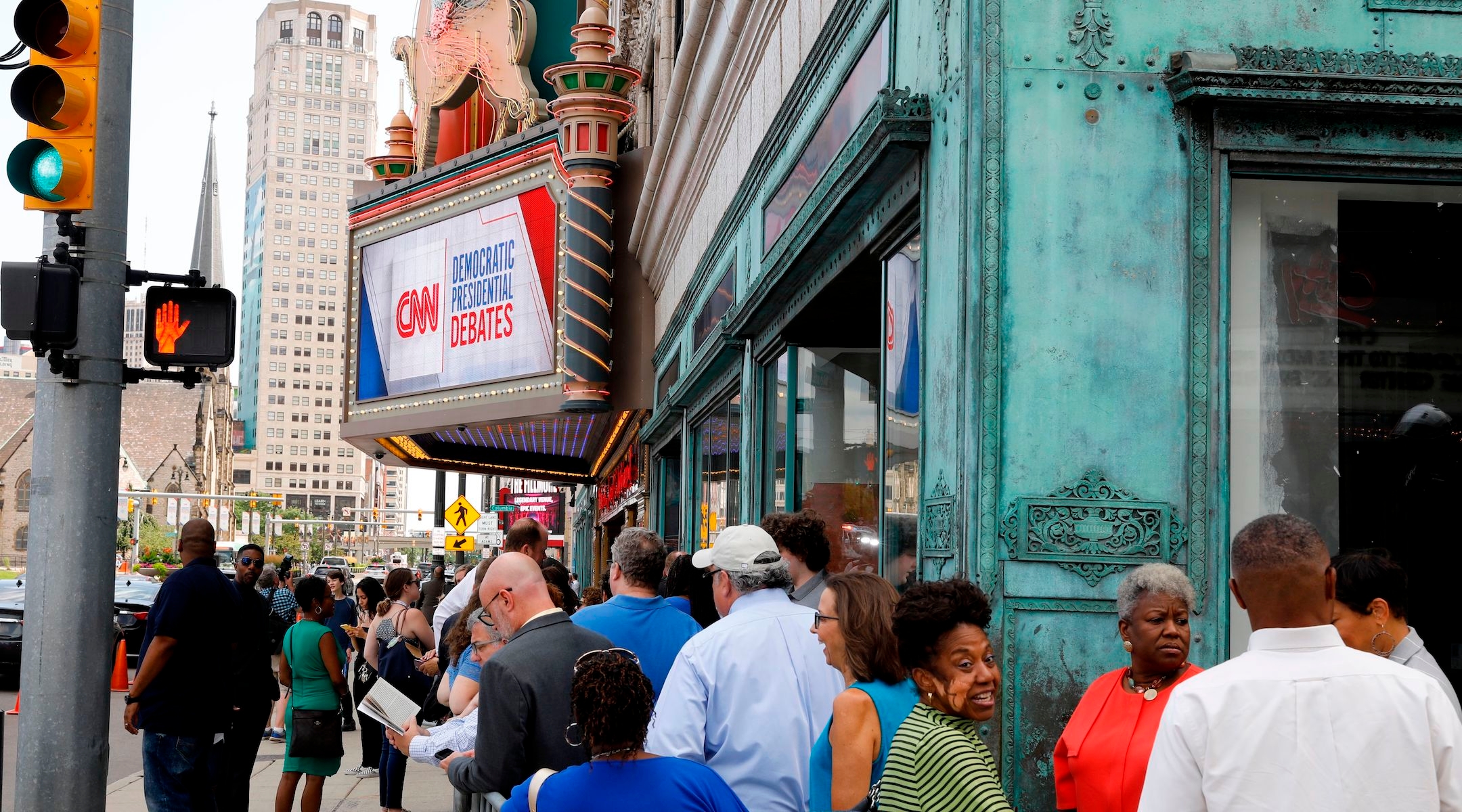
People line up outside the Fox Theatre in Detroit, Mich., ahead of the second Democratic Presidential Debate, July 31, 2019. (Jeff Kowalsky/AFP/Getty Images)
Tlaib is one of just two House members who back the boycott Israel movement, and the only one to have suggested that Israel should not exist as a Jewish state. For many of the folks around the table, Tlaib and Rep. Ilhan Omar, D-Minn. (the other Israel boycott backer, but who backs Israel’s existence as a Jewish state), are the sharp edge of a threat to the party that they otherwise favor: the Democrats.
The pro-Israel lay leader described the “intersectionality” advanced by “The Squad,” the quartet of freshman progressive congresswomen composed of Tlaib, Omar, Alexandria Ocasio-Cortez of New York and Ayanna Pressley of Massachusetts, as the flip side of Trump. “Post-factual,” the leader called them, saying they like Trump rely on racial identity politics instead of policy.
“The weaker one is and the darker one is” determines who is “in the right,” the lay leader said of The Squad, an “anti-intellectual” posture that bodes ill for Jews and Israel.
Pro-Israel money is rarely directed against surefire winners, because losing would embarrass the pro-Israel community. Tlaib is seen as beatable. She (barely) won a primary in a majority-black district, against several black candidates. The thinking in the room was that the African-American community in the 13th will coalesce around a single candidate — likely Jones — and that candidate would draw pro-Israel support.
Tlaib is not the Democratic Party
Outside the room, progressives were more sanguine about the influence of Tlaib and the others on the party. Halie Soifer, who directs the Jewish Democratic Council of America, met with me after the debates and said she was planning to mount a campaign questioning the reflexive “both-sidesism” in the established community, which seems to fret equally about Trump and figures like Tlaib.
“There is a fundamental and critically important difference between the small number of voices on the left whose views on Israel are outside the mainstream, and the virulent anti-Semites and racists on the right who pose a grave danger to the Jewish and other minority communities, the devastating result of which we saw in Pittsburgh and Poway,” Soifer, a Michigander, said afterward in an email, referring to the deadly synagogue attacks.
Tom Perez, the chairman of the Democratic National Committee, told me after the debates that he’s not worried.
“You look at the polling, Jewish support for Democrats is very, very strong,” he said. “There’s a direct causal link because [Trump’s] rhetoric and acts of hate crimes and we all know that the Jewish community historically has been one of the most frequent victims of hate crimes … Jewish voters get it.”
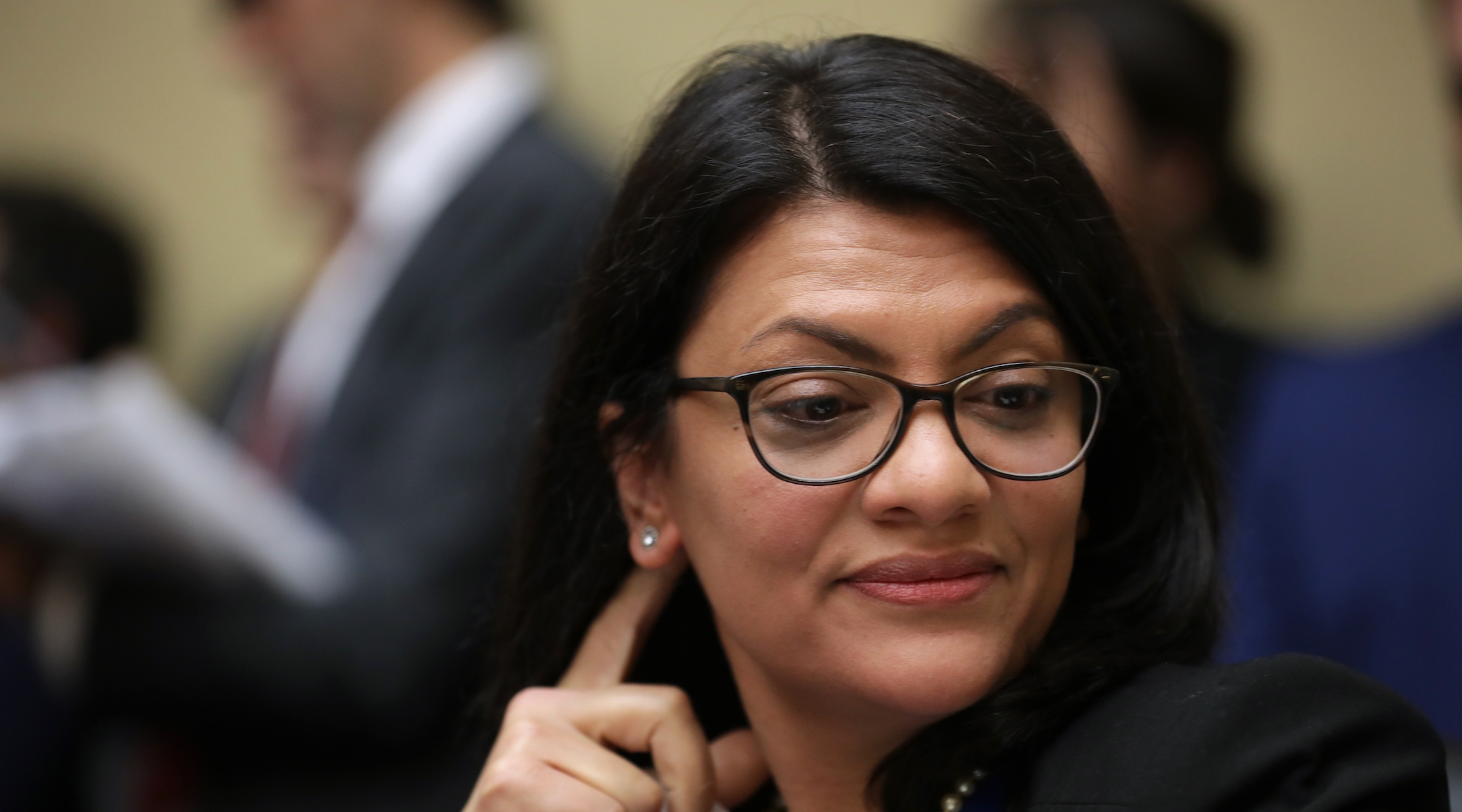
Rep. Rashida Tlaib listens to Michael Cohen at his testimony before the House Oversight Committee on Capitol Hill, Feb. 27, 2019. (Chip Somodevilla/Getty Images)
Rabbi Alpert, who was not part of the roundtable, told me that taking aim at Tlaib would be catastrophic for Jewish community relations, and for the issue that more than any other keeps Jewish community leaders awake: keeping younger Jews engaged.
“It’s not about Rashida,” said Alpert, who works closely with Tlaib and Andy Levin — the Jewish Democrat whose 9th District abuts Tlaib’s — on social justice issues like water access, transit, workers’ rights and foreclosures. We met at a DNC cocktail event.
“It’s about Jews making alliances with communities of color, and not getting distracted by differences of opinion” when one agrees “80-90 percent” on the issues with Tlaib, she said. The congresswoman, Alpert said, has the support of Jewish young people moving back into Detroit from the suburbs. “We will be losing the next generation of Jews. To think we would spend energy to bring her down is deranged.”
The roundtable too was proud of their relations with the community at large. Rep. Brenda Lawrence, in whose 14th District the majority of the Jewish community lives, in June helped launch the congressional black-Jewish caucus. There was a natural alliance with the Chaldean community, whose roots are in Turkey and Iraq, because of shared concerns about Islamist extremism as well as Trump’s immigration restrictions. And there was ongoing work with local Muslims, despite the radicalization of some Shiites since the rise in the 1980s of Hezbollah in Lebanon. (A Dearborn restaurateur in 2006 was indicted for funneling money to the terrorist group.)
It’s not just Tlaib — there’s Debbie Dingell
Tlaib is an Arab American who does not represent the district where most Detroit area Arab Americans reside. That would be the 12th, where Debbie Dingell is the congresswoman. People around the table said Dingell, once seen as pro-Israel among donors, is under pressure in her district to line up with Tlaib, and Lis and others described frustrating meetings they had with her.
Dingell was among 17 Democrats who voted last week against a nonbinding resolution condemning the boycott Israel movement that overwhelmingly passed in the House. And last month she cosponsored a bill that would bar Israel from using U.S. military aid to detain Palestinian minors.
The likelihood is that pro-Israel money for Dingell will disappear, but because she is popular and unlikely to face a serious primary, there’s no talk of actively opposing her.
“There’s been a Dingell in her district since before I was born,” said Marty Adelman, a retired law professor who was vocal in his support for Trump. “And I’m 82.”
Adelman was not exaggerating. Dingell’s late husband is John Dingell, who held the district since 1955. His predecessor was his father, John Dingell Sr., who was elected in 1932.
What do you do about Trump?
The bulk of the roundtable conversation might have taken place at any federation get-together anywhere in the country: how to reconcile the Jewish majority’s revulsion with Trump with support for moves seen as pro-Israel, including moving the U.S. embassy to Jerusalem and recognizing Israeli sovereignty over the Golan Heights.
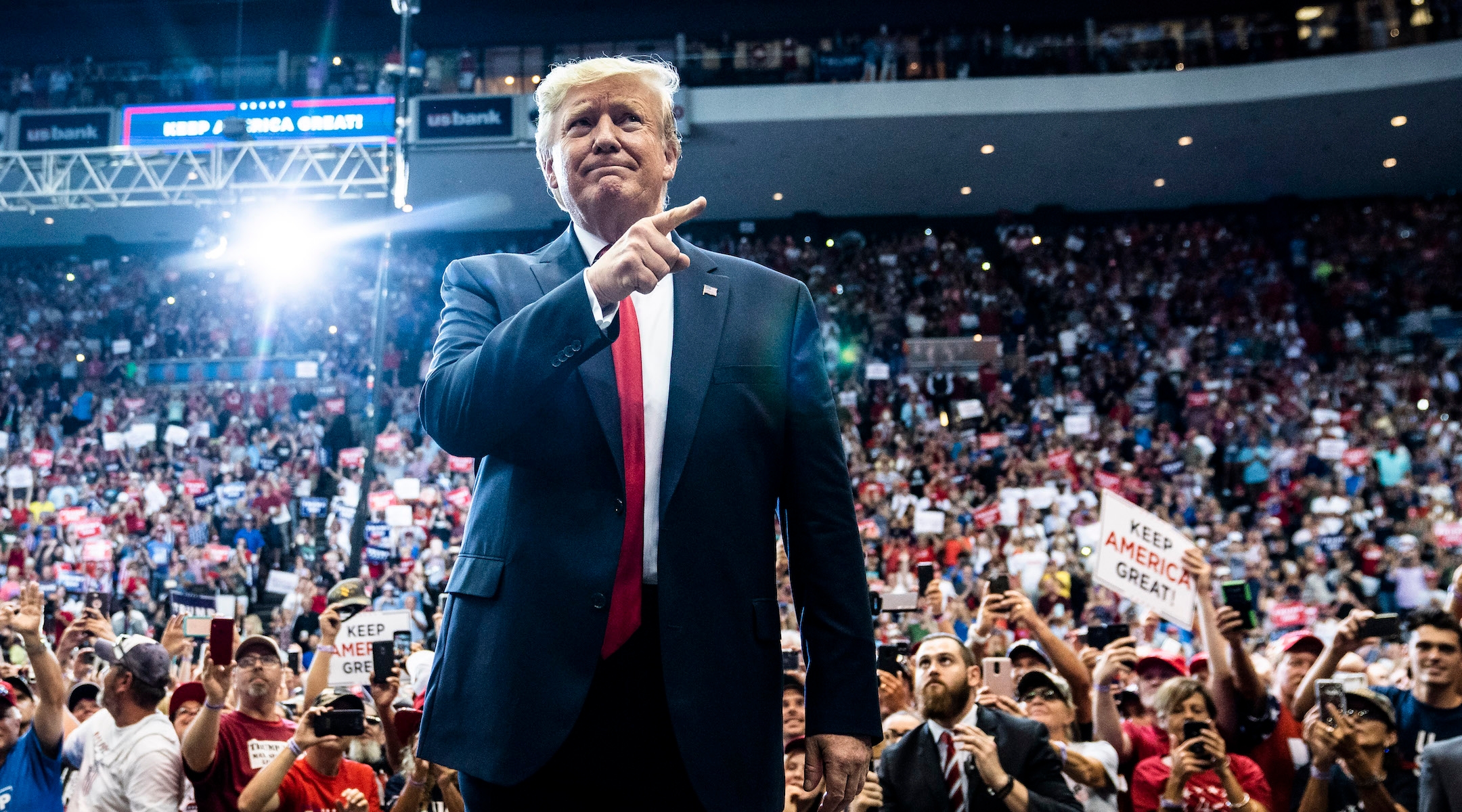
President Donald Trump at a rally at U.S. Bank Arena in Cincinnati, Ohio, Aug. 1, 2019. (Jabin Botsford/The Washington Post via Getty Images)
“The hatred and vitriol coming out of D.C. are trickling down, causing anti-Semitism to be more vocal and accepted,” said Nanci Rands, a realtor and lay leader for the American Jewish Committee.
Alicia Chandler, who is the interim director of the Jewish Community Relations Council (which in Detroit is partnered with the American Jewish Committee) noted the proliferation of anti-Semitic flyers in the area.
Rands said she had spoken to participants in the AJC’s Project Interchange program, which brings young leaders around the globe to Israel, who said Trump’s biases were diminishing U.S. influence.
The unnamed pro-Israel lay leader said Trump’s bias, expressed in his attacks on “The Squad” and more recently in his incessant belittling of Baltimore, a majority-black city, and its African-American congressman, Elijah Cummings, was stoking racial bias. The leader also said that while the embassy move and the Golan recognition were welcome, Trump’s isolationism and the diminishment of U.S. influence were in the long run bad for Israel.
The week I was in Detroit there were a number of events reflecting Jewish anxieties about Trump. On Sunday, there was the launch of a “Michigan Jewish Democratic Caucus,” aimed at rallying support to flip the state, which went for Trump by a tiny margin in 2016. On Thursday, more than a dozen rabbis spanning the religious spectrum were to meet at Temple Beth El in Bloomfield Hills to discuss “the crisis on our southern border,” according to a flyer.
That kind of action irked Adelman, the retired law professor and a Trump supporter. He saw it as needlessly taking on the president whom he described as the most pro-Israel and most pro-Jewish in his lifetime. “Trump is not targeting minorities,” he said. “What’s going on is shameful.” Instead, he said, the real threat was from the left. He was critical of the pushback Trump got from Jewish groups for telling The Squad to “go back” to their countries of origin.
Chandler’s eyes widened. Tlaib was a “native-born American,” she said.
“We’ve heard it as Jews,” said Lis.
Adelman retreated — a little.
“I’m not going to defend every statement,” he said.
The right will be heard
That’s the kind of impasse that led to the establishment, after the 2016 election, of the Michigan Jewish Action Council, a conservative group.
I met with three of its members at the suburban home of the group’s blogger Harry Onickel. Also present were Dorene Weisberg and Ed Kohl.
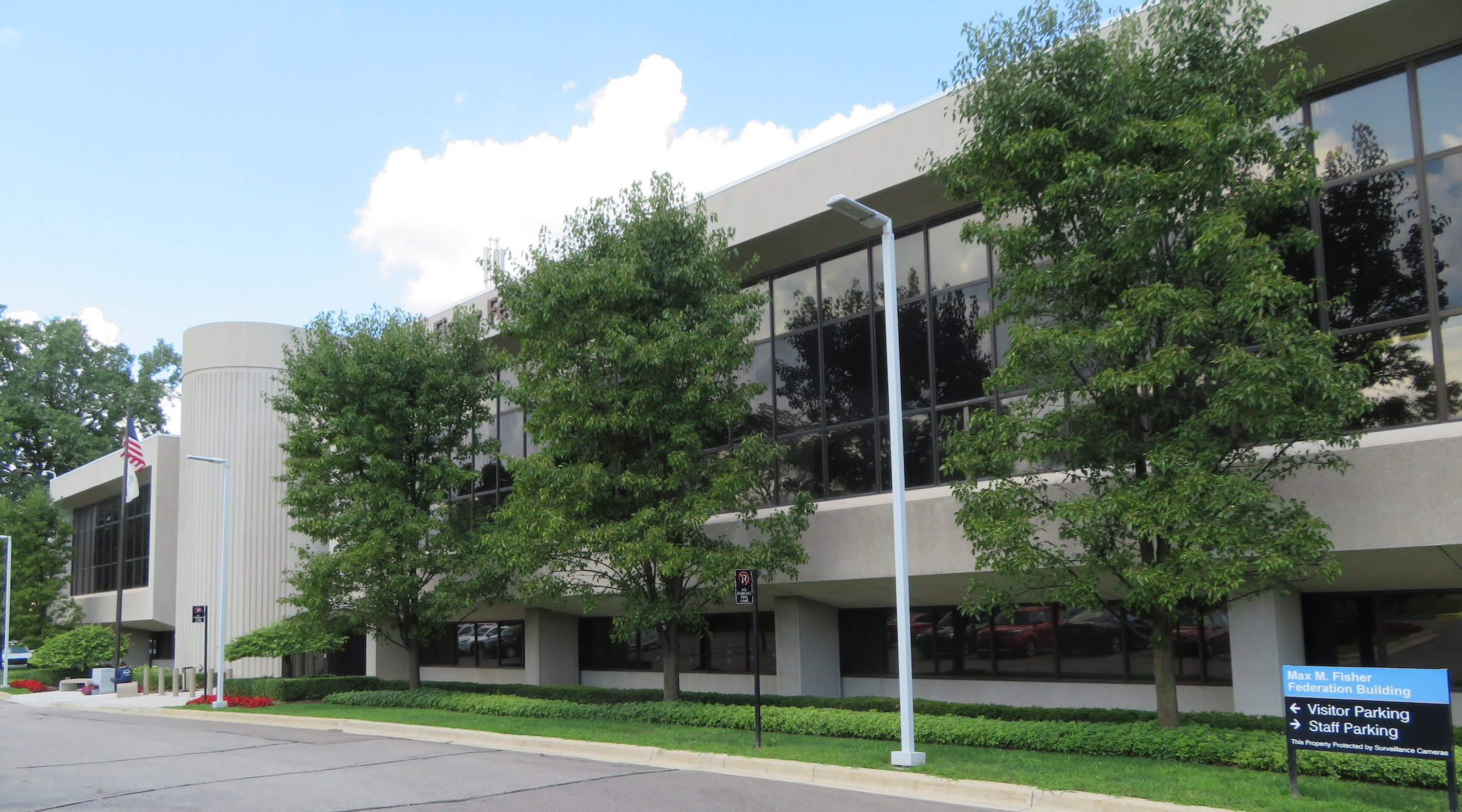
The Jewish federation building in Detroit sits in the Bloomfield Hills suburb. (Ron Kampeas)
They described a sense of being frozen out of the communal conversation. Kohl, like Adelman, was especially incensed when the Jewish community came to the defense of “The Squad” after Trump’s “go back” attacks.
“We told them you are not the spokespeople for the Jewish community, you are spokesmen for some of the Jewish people,” he said.
Weisberg said that the group networks locally and nationally with other conservative groups to advance a conservative pro-Israel agenda, and that it draws more than a hundred people to its meetings. A flyer for its annual event, next month, reads: “Jews have been maligned for being conservative and have had to hide their perspective from the public square.”
I told the roundtable that I had set up a meeting with the conservative group. Some people present said they had not even heard of the group, while others said it was marginal.
I met Allan Gale, who retired several years ago as the JCRC director. He told me that in retirement he sought out a discussion group, and had heard of two of them for Jewish retirees, both meeting weekly at the JCC: one for Trump supporters, one against. He opted to attend neither, finding the idea of sitting in with politically siloed groups to be boring.
A sense of regret over such polarization infused the roundtable meeting.
“If you look at our federation, we’ve worked exceedingly well together,” said David Kramer, a lawyer whose family is deeply involved in the federation and Democratic politics. “That’s what scares me the most. If the feeling becomes, ‘There’s a right and a wrong…’”
A version of this post first appeared in The Tell, Ron Kampeas’ weekly newsletter on Jewish news from Washington. Subscribe to it here.
JTA has documented Jewish history in real-time for over a century. Keep our journalism strong by joining us in supporting independent, award-winning reporting.

